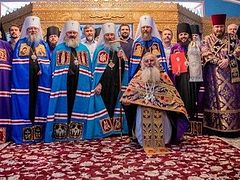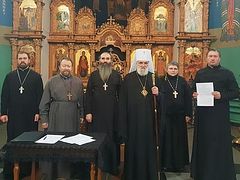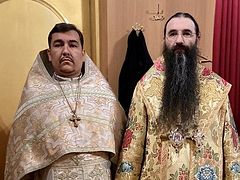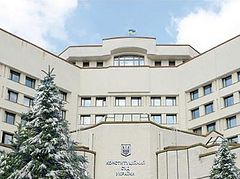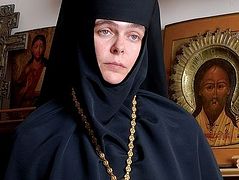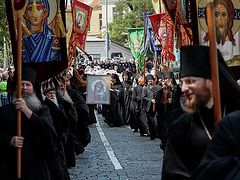Kiev, May 8, 2020
Despite the manipulation of public opinion by the media and the previous presidential administration, the canonical Ukrainian Orthodox Church continues to grow and expand because people go to church seeking God, not political ideas, His Eminence Metropolitan Anthony of Boryspil and Brovary, the Chancellor of the UOC, recently said on Ukrainian television.
“In fact, despite the pressure and manipulation of public consciousness, the Ukrainian Orthodox Church is not shrinking, even considering the seizure of our churches and the re-registrations; every year we increase,” Met. Anthony explained, reports the Information Center of the UOC.
At the end of last year, it was reported that the canonical Ukrainian Church under His Beatitude Metropolitan Onuphry of Kiev and All Ukraine grew by nearly 250 parishes and more than 100 monastics in 2019.
“This means the faithful understand why they go to church. They don’t go to a political situation; people are seeking God and find Him in true churches—the churches of the canonical Church. This openness of the Ukrainian people to God is thus translated through the opening of new parishes,” Met. Anthony said.
Under Poroshenko, there was a order on the ground not to register the UOC’s new parishes, though this gradually began to be rectified under President Zelensky. Nevertheless, even under the previous administration, the canonical Church grew every year both in number of parishes and number of parishioners, Met. Anthony noted.
“If people are not looking for a political idea, but for God, they come to a real Church where God is present,” he added.
However, a number of media outlets and TV stations continue to spread false and misleading information about the canonical Ukrainian Church. Even though the UOC is the largest Church in Ukraine, taxpayer-funded stations refused to broadcast its Paschal services, the Chancellor noted.
However, under Zelensky, there are no planned, systematic operations against the UOC, Met. Anthony said, though Poroshenko’s apparatus and legacy is tenacious and many people still live in the tradition of attempting to destroy the Church.
“People believe what they see on TV. Previously, they believed what was written in books, but now they believe what is said from TV screens. People who are not deeply ecclesiastical largely evaluate life through the prism of what they are told,” His Eminence lamented.


